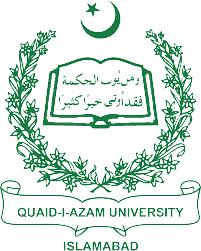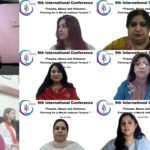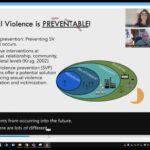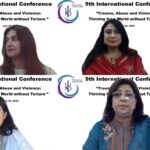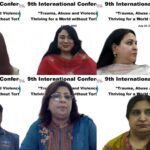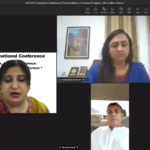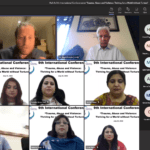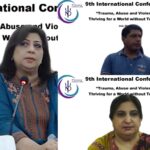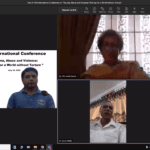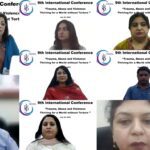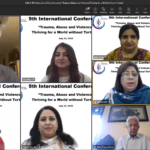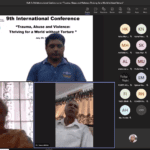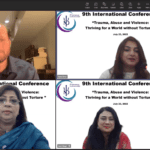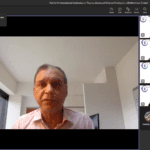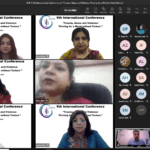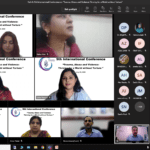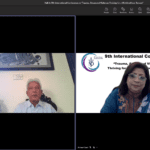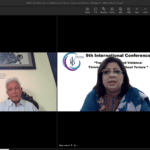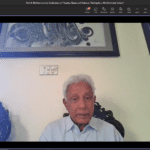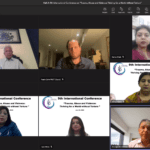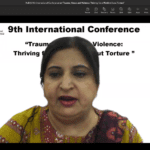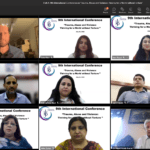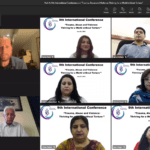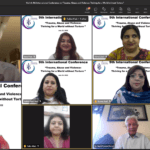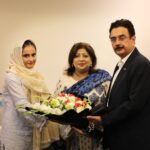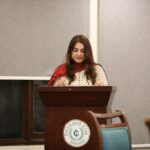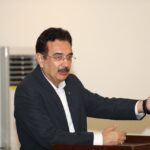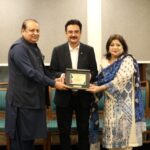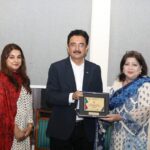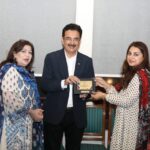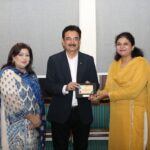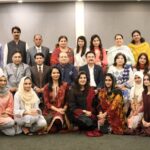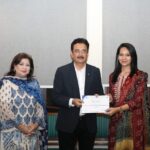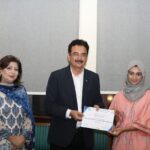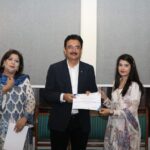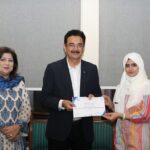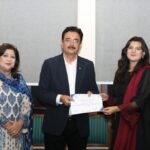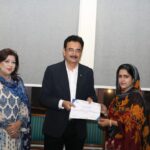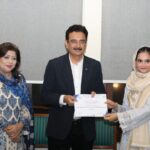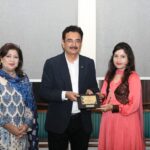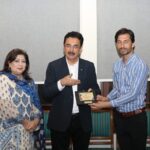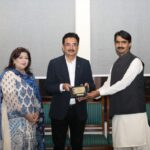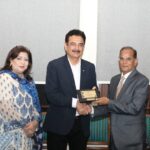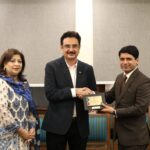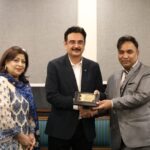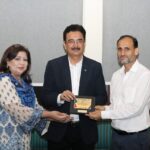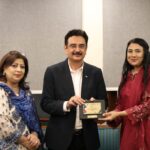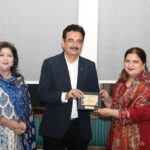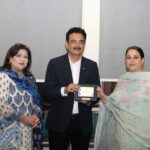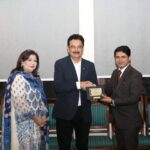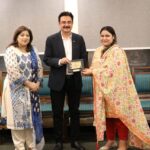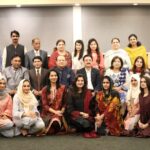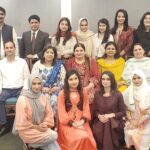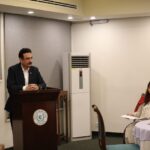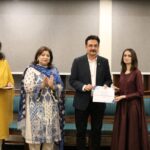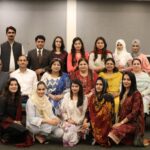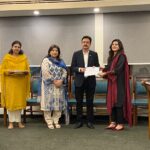9th International Conference
9th International Conference
Trauma, Abuse, & Violence: Thriving For A World Without Torture
Conference Overview
Welcome Note by Prof. Dr. Rubina Hanif (Chief Organizer, Director, National Institute of Psychology, Quaid-i-Azam University, Islamabad)
In her welcome note, Prof. Dr. Rubina Hanif welcomed all the speakers and audience and announced themes designed for the conference that provided a wide array for professionals and students to come together with their visions of a better world for trauma survivors. The conference objectives were exuberantly expressed through traumatic events and the threats they pose to the well-being of individuals and overall society. She mentioned that, to cater to the diverse objectives of the conference, NIP executed pre-conference workshops intending to train students and researchers on effectively managing the impact of trauma. She further explained that the series of workshops included anger management with survivors of trauma, expressive art therapy, and play therapy with survivors of trauma. These pre-conference workshop topics encompass the prevention and treatment of trauma and were successfully conducted by experts in the field. She mentioned that conference was planned in a virtual mode to allow diversity and inclusion of participants across the globe. She aimed to streamline guidelines at the national level considering findings presented in scientific sessions. Lastly, she paid her thanks to all the keynote speakers, vice chancellor, dean social sciences, and conference collaborators.
Address by Prof. Dr. Muhammad Ali (Vice Chancellor, Quaid-i-Azam University, Islamabad)
Dr. Muhammad Ali emphasized that this conference was a great initiative to gather academicians, professors, researchers, practitioners, and activists at a single platform to discuss the most recent innovations, trends, and concerns as well as practical challenges encountered, and solutions adopted in the field of trauma, abuse, and violence. Additionally, it will also inculcate the research culture among the entire fraternity of psychology in our country, thereby, contributing to the collective goal of surviving in a violence-free society. He thanked the Director, NIP, and conference coordinator for the invitation and appreciated the efforts of the director and organizers of this conference for taking the initiative to highlight such sensitive matters. He also emphasized in his speech to monitor the drug addiction and violent behaviors of students in universities.
Keynote Lecture (Global and Local Anti-Torture Movements) by Frank Cohn (Vancouver Association for Survivors of Torture, VAST)
The keynote speaker, Frank Cohn, appreciated the local and global movements against torture. He further explained that every country has a rich history of inhabitance from different ethnicities and cultures or skin colors. A key point worth highlighting regarding the role of Vancouver Association for Survivors of Torture (VAST), working as an intrinsically local function for Canadian trauma survivors, he further added that this organization is working on mental health support or counseling through different trauma treatment modalities. He also mentioned that the common countries that reported trauma in their organization were Afghanistan, Mexico, Russia, and Canada. Refugees from such countries, where torture is very common, resulted in incarceration in Canada. The refugees of all different countries are reported in Canadian statistics. He concluded while highlighting the need to work conjointly to overcome this issue by centralizing the efforts to the local areas to minimize the challenges that we face to reduce the trauma in native countries as well as trauma of migration.
Keynote Lecture (Preventing Torture in Police Settings: Insights and Reflections) by Dr. Asir Ajmal (Dean & Professor of Psychology at GIFT University)
The keynote speaker, Dr. Asir Ajmal, highlighted the fear of police in Pakistani population and emphasized the need for police from an international country’s perspective though the police brutality and torture experienced in indigenous police stations are far more incomparable to international countries. He talked about the tendency of parents to pursue their children for jobs in police irrespective of their personality traits which may lead to need of a well-defined selection criterion for jobs of police. He further added that IQ tests have been a concern in the United States but its not part of selection criterion in Pakistan. Other than the personality factors; he discussed some situational factors that greatly impact the functioning of the police in the country. He concluded that first need to make the recruitment process more scientific. The other recommendation is that there is a need to send the recruits to the police academy for training. In that way, the mindset is needed to be changed. Transferring to a police academy should not be considered as a punishment but a way of learning to ensure to minimize the dehumanized behaviors of police officers.
Keynote Lecture (Prevention Programs to Confront Sexual Violence Victimization in South Asian University Campuses), Prof. Dr. Lawrence H. Gerstein (Center for Peace & Conflict Studies, Ball State University, USA) and Dr. Aashna Banerjee (Center for Peace & Conflict Studies, Ball State University, USA)
The keynote speakers talked about the prevention programs that can be adapted to cope with the sexual violence victimization. It was highlighted that the universities need to pay attention to devise preventing techniques against sexual violence victimization happening at the university level to ensure the mental health of students. The speakers also highlighted that the intervention programs regarding bullying and victimization should be designed through collaboration at the national level to be implemented in educational institutes at larger scale.
Keynote Lecture (Elderly Abuse and Need for Social Protection: Dr. Wajid Pirzada (CEO Roots Pakistan-A Grassroots Development Action)
The keynote speaker, Dr. Wajid Pirzada, emphasized the under researched area of elderly abuse and the need for social protection programs. He mentioned that elderly population belong to the low-income group in Pakistan and face various psychosocial consequences including social insecurity and lack of income. He articulated that the social protection programs enable the elderly to cope with such situations and suggested that Government needs the sensitization of pension for the elderly. He further explained that social protection is the major area which Government can ensure to induce feelings of security. He added that the elderly population experience different forms of abuse like physical, financial, and sexual abuse and Roots Pakistan has the vision to provides social protection programs for this population for past two decades. Other problems, which they face, include a growing gap between the elderly and their offspring, dependency, lack of pension programs, competitive financial world which is increasing the youngsters’ tendency to get rid of financial responsibilities of elderly people. He greatly emphasized the social protection program in industrialized societies to provide protection in face of above-mentioned issues. In Pakistan, there are no specialized systems for the old age benefit programs for making the elderly useful members of society and need of time is to develop such programs.
Scientific Session 1A
The session chair of the activity was Prof. Dr. Tanvir Akhtar (Department of Psychology, Foundation University, Islamabad), and the session was co-chaired by Prof. Dr. Iffat Rohail (Department of Psychology, Foundation University, Islamabad). The session in charge was Dr. Jamil A. Malik (National Institute of Psychology, Quaid-i-Azam University, Islamabad). A total of nine research papers were presented in the activity that mainly discussed child maltreatment/adverse childhood experiences. The session was concluded with the comments given by Chair Dr. Tanveer by congratulating the NIP team for organizing the conference on the very pertinent and important aspect of this issue. It is very prevalent in South Asia, and this issue is more prone. The comments on the papers were that childhood trauma and maltreatment have played a very crucial role in the adult years of the child. He suggested that critical points that should be highlighted in the papers presented in this session should be to address the preventions based on this issue. Dr. Iffat Rohail added that themes are based on a very sensitive issue, and she humbly suggested that it is high time to develop intervention on this issue. The session chair concluded the session by appreciating the session presenters.
Scientific Session 1B
The session in-charge for the activity was Dr. Sobia Masood (National Institute of Psychology, Quaid-i-Azam University, Islamabad). This session was chaired by Prof. Dr. M. Tahir Khalily (Shifa Tameer-e-Millat University, Islamabad) and Dr. Syeda Shahida Batool (Department of Psychology, Government College University, Lahore) was co-chair for this session. A total of eight research papers were presented in the activity that mainly discussed the Child Maltreatment/Adverse Childhood Experiences. Towards the end of the session, Dr. Shahida Batool appreciated all the presenters and gave her detailed feedback in which she asked presenters to focus on strength of conceptualization and rationale of research studies based on both qualitative and quantitative sampling techniques. She also talked about the importance of the theme and emphasized the need to explore more on such kind of topics. Prof. Dr. Tahir Khalili highlighted the techniques of intervention and appreciated all the participants for their work.
Scientific Session 1C
The theme of the scientific session was Adult survivors of Maltreatment and traumas and it was chaired and co-chaired by Prof. Dr. Anila Kamal (Vice Chancellor, Rawalpindi Women University, Rawalpindi) and Dr. Najma Malik (Department of Psychology, University of Sargodha, Sargodha) respectively. The session in-charge for current activity was Dr. Nelofar Kiran Rauf (National Institute of Psychology, Quaid-i-Azam University, Islamabad). Twelve research papers were presented in the current session. The oral presentations highlighted major traumatic events related to adults such as, marital conflicts, parental rejection, sexual harassment Burn survivor, effect of Covid-19 pandemic. Further, this session addressed postpartum depression, workplace bullying and harassment and Rumination. After presentations, question-answer session took place after which the co-chair Dr. Najma Malik was invited to give his reflections on the session. She firstly, thanked and congraulated the organizers for successfully arranging a platform on which sensitive issues could be discussed. She also appreciated the participants for their interesting and eye opening research findings. She reflected upon the work of the researcher i.e., they should include theoretical models in their research and also adapting those models in indigenous culture. There must be concrete inclusion and exclusion criteria for sample selection. She also suggested that there is a need of qualitative researches for theoretical implications of the finding researchers must add In the end she emphasized that we have to be careful in how these trauma effect the mental health of individuals and what resilience strategies one need to develop to deal with these traumatic event.
Scientific Session 2A
The session chair of the activity were Prof. Dr. Muhammad Jahanzeb Khan (Vice Chancellor FATA University, Khyber Pakhtunkhwa) and Dr. Aneela Maqsood (Department of Behavioral Sciences, Fatima Jinnah Women University, Rawalpindi). The session incharge was Dr. Aisha Zubair (National Institute of Psychology, Quaid-i-Azam University, Islamabad). A total of thirteen research papers were presented in the activity that mainly discussed adolescent trauma and youth violence. To conclude this session, Dr. Aneela Masood highlighted the importance of trauma in the life of children and adolescents. She mentioned it concerning different settings of our life. She also addressed the significance of traumatic life experiences and the importance of practitioners in dealing with trauma. She suggested that we should have structured programs for dealing with trauma at school, academic institutions, and workplaces. She appreciated the well-structured arrangement of the sessions in this conference session. She also suggested that interventions are required to further explore the questions raised during the presentations that are still required to address in future research. A thorough investigation is required to focus on perceived neglect of trauma among adolescents.
Scientific Session 2B
The session incharge for the activity was Dr. Naeem Aslam (National Institute of Psychology, Quaid-i-Azam University, Islamabad). This session was chaired by Prof. Dr. Syeda Salma Hassan (Department of Psychology, Government College University, Lahore) and Dr. Nazia Iqbal (Department of Psychology, International Islamic University, Islamabad). A total of nine research papers were presented in the activity which mainly focused on the theme of Domestic and Sexual Violence. Towards the end of the session, Dr. Salma appreciated all the researchers for conducting research in such challenging and sensitive study domain like social dominance of men, rape victimization, infidelity, sexual harassment and gaslighting. She emphasized the need of developing the indigenous scales in these areas and suggested the academia to link with NGOs to create awareness seminars and rase voice against these issues. Dr. Nazia Iqbal also highlighted the need to develop indigenous scales and more qualitative research to be conducted in future.
Scientific Session 2C
The theme of the session was Preventing, Assessing and Treating Trauma. It was chaired by Prof. Dr. Sarwat Sultan (Department of Applied Psychology, Bahauddin Zakariya University, Multan) and Prof. Dr. Amina Muazzam (Department of Applied Psychology, Lahore College for Women University). Dr. Imran Bukhari (National Institute of Psychology, Quaid-i-Azam University, Islamabad) was the session incharge. In this activity, seven research papers were presented in total encompassing the effects of anti-bullying intervention plan, psychotherapeutic management of PTSD among women exposed to domestic violence, Trauma Focused Cognitive Behavioral Therapy Approach, prediction of traumatic stress using psychological capital. Discussion was also generated about oncological diagnosis statement as a traumatic situation, reconceptualizing severe traumatic stress reactions of children and young people, and methodological concepts for learned helplessness. The session chair, Dr. Sarwat Sultan complimented the choice of research design in the research work of all presenters. She congratulated the head of department and her team for successfully arranging the conference. She also appreciated the work of researchers and gave each of the presenter separate remarks for their wonderful work. The co-chair Dr. Amina Muazzam highly appreciated the effort of NIP for organizing the conference on Trauma, Abuse and Violence. She added that talking about the trauma amid covid-19 pandemic is an effort to bring change in one’s way of dealing with the trauma. She appreciated the interventive, experimental, qualitative, and case study methods of the research as these are approaches to develop indigenous qualitative model. She also posed that stigmatization on people related to certain illness or trauma is the reason behind their lower self-esteem. In her closing remarks she thanked and once again congratulated head of department for organizing a wonderful conference.
Scientific Session 3A
The session chairs of the activity were Prof. Dr. Farah Malik (Institute of Applied Psychology, University of Punjab, Lahore) and Dr. Shazia Khalid (Department of Social Sciences and Humanities, National University of Medical Sciences, Rawalpindi). The session incharge was Ms. Raiha Aftab (National Institute of Psychology, Quaid-i-Azam University, Islamabad). A total of seven research papers were presented in the activity that mainly discussed symposia papers. Dr. Shazia concluded the session by giving her remarks regarding the presentations and results of the research. Dr. Farah Malik convincingly emphasized the improvement of the methodology of the research presented in the session. She also emphasized the importance of studying the abuse faced by the children in the family from their childhood. She further added that indigenous tools are available for the assessment and testing of children with trauma.
Scientific Session 3B
The session incharge for the activity was Dr. Irum Naqvi (National Institute of Psychology, Quaid-i-Azam University, Islamabad). This session was chaired by Prof. Dr. Rafia Rafique (Institute of Applied Psychology, University of the Punjab) and Prof. Dr. Anis-ul-Haq (Department of Applied Psychology, National University of Modern Languages, Islamabad. A total of eleven research papers were presented in the activity which mainly focused on the theme of Media and War Associated Induced Trauma. Towards the end of the session Dr. Anis ul Haq appreciated all the participants for their efforts and highlighted the coping strategies to be used after trauma. He emphasized the need to investigate the impact of globalization. He also highlighted the role of Higher Education Commission Pakistan in eradicating bullying and trauma in academics settings.
Photo Gallery of 9th International Conference 2022
NIP Celebrates Success of 9th International Conference
When it comes to paying gratitude for hard work of employees, NIP never delays celebrating the success of its team. For acknowledging the efforts of entire team during 9th International Conference on “Trauma, Abuse, and Violence: Thriving for a World Without Torture”, NIP arranged a certificate/shields distribution ceremony and dinner on August 15, 2022 for staff, faculty, and students who were part of organizing committee. Vice Chancellor Dr. Muhammad Ali was invited as Chief Guest of the ceremony along with Dean Faculty Social Sciences Dr. Muhammad Idrees and Registrar Dr. Raja Qaiser Ahmed. Ceremony started with welcome note of organizer conference organizer Dr. Saira Khan and preceded with welcome address of Director NIP Prof. Dr. Rubina Hanif and speech of Vice Chancellor Dr. Muhammad Ali. Director and Vice Chancellor appreciated the efforts of NIP team for conducting another international conference successfully and hoped that Institute will grow leaps and bounds with such efforts.

